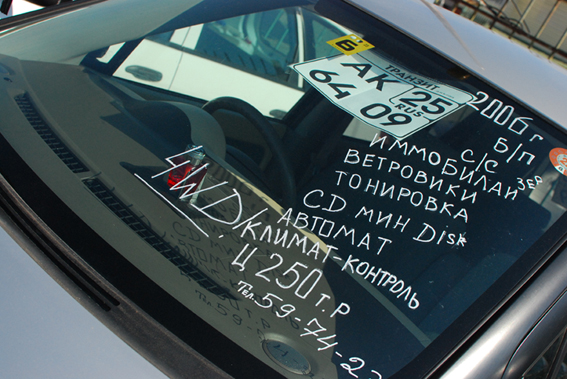The Russian used auto industry relies on used car shipments from Japanese companies that have dried up since the March earthquake and problems at the Fukushima plant.

A car for sale at the Green Corner car market in Vladivostok. (Photo: Sebastian Strangio)
VLADIVOSTOK, Russia—The Zelyony Ugol (Green Corner) used-car market, on the outskirts of Vladivostok, is among the largest of its kind in Russia. In vast gravel lots, all manner of vehicles – from rosy-pink Honda hatchbacks to gold-tinted Lexus roadsters – sit in neat rows, prices scrawled across their windshields in white.
Car imports have long been the lifeblood of this port city. At one point, 1 in 3 of the city’s residents was somehow involved in the auto business, and the industry has weathered many challenges. In 2008, a sharp hike in car import taxes brought out thousands in protest onto city streets.
Once again, the city’s used-car dealers are toughing it out. Japan’s recent earthquake and tsunami have cast a pall over the business, which relies on used cars shipped from Japanese suppliers. Natalya, a car dealer at the Green Corner who declined to give her last name, said the tsunami that ravaged Japan’s east coast in March had simply “washed away” many car lots. Radiation from the Fukushima nuclear power plant has contaminated others.
In mid-April, customs officers at Vladivostok’s port impounded a shipment of used Japanese cars after detecting elevated levels of radiation from the vehicles. It’s unclear how or when they could be decontaminated. “From day to day, the car parks in Japan are shrinking in size,” Natalya said, shrugging her shoulders, as if resigned to perennial uncertainty. “People now are buying cars, but they don’t know if these cars will come or not.”
[Published in the Christian Science Monitor, May 30, 2011]


